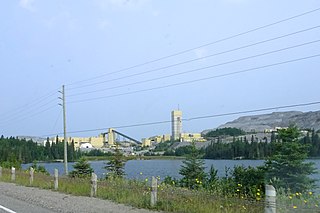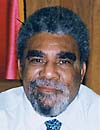Related Research Articles

Barrick Gold Corporation is a mining company that produces gold and copper with 16 operating sites in 13 countries. It is headquartered in Toronto, Ontario, Canada. It has mining operations in Argentina, Canada, Chile, Côte d'Ivoire, Democratic Republic of the Congo, Dominican Republic, Mali, Papua New Guinea, Saudi Arabia, Tanzania, the United States and Zambia. In 2019, it produced 5.5 million ounces of gold at all-in sustaining costs of $894/ounce and 432 million pounds of copper at all-in sustaining costs of $2.52/pound. As of 31 December 2019, the company had 71 million ounces of proven and probable gold reserves.
Placer Dome Inc. was a large mining company specializing in gold and other precious metals, with corporate headquarters in Vancouver, British Columbia, Canada.

The Right Honourable Sir Mekere Morauta was a Papua New Guinean politician and economist who served as the 7th Prime Minister of Papua New Guinea from 1999 to 2002. Inheriting a depressed economy and a fractious legislature, he embarked on fundamental reforms of the country's economy and political system.
Arthur Somare is a former Member of the National Parliament of Papua New Guinea (PNG). He represented the electorate of Angoram Open in East Sepik province for the National Alliance Party from 1997 until he lost in the 2012 general elections.

The Porgera Gold Mine is a large gold and silver mining operation in near Porgera, Enga province, Papua New Guinea (PNG), located at the head of the Porgera Valley. The mine is situated in the rain forest covered highlands at an altitude of 2,200 to 2,700 m, in a region of high rainfall, landslides, and frequent earthquakes.

Mining in Papua New Guinea is an important part of the Papua New Guinea economy.
Papua New Guinea Gas has been an exporter of liquefied natural gas (LNG) since 2014. The LNG sector is important in the PNG's economy: the value of LNG exports from PNG in 2020 was estimated to be US$2;95 billion. Natural gas is reported to contribute 5,25% to GDP in 2019. On a global scale, PNG is a minor player. PNG's share of world gas reserves is estimated low at 0.08% In 2020, PNG was ranked in 2020 to be the 16t on the list of gas exporting countries.
Michael John Manning OBE was an Australian-born Papua New Guinean anti-corruption activist and economist. Manning served as the second Chairman of Transparency International PNG (TIPNG), one of Papua New Guinea's largest organizations dedicated to eradicating corruption, from 2003 until 2008. He was a naturalized citizen of Papua New Guinea.
Papua New Guinea (PNG) is a constitutional parliamentary democracy with an estimated population of 6,187,591. Police brutality, provincial power struggles, violence against women, and government corruption all contribute to the low awareness of basic human rights in the country.
Paul Tiensten is a former Papua New Guinean politician and former National Alliance Member of Parliament for Pomio Open. Tiensten is currently serving a nine-year sentence for corruption.
The Papua New Guinea Forest Authority (PNGFA) was established in 1993 under the Forestry Act, 1991. It replaced the former Department of Forest and unified all the Provincial Forest Divisions and the Forest Industries Council. This restructuring was the result of the 1989 Barnett Commission of Inquiry into forestry in Papua New Guinea.
Mineral Resources Development Company Limited (MRDC) was established in 1975 and is 100% owned by the Government of Papua New Guinea.
Peter Wararu Waranaka is a Papua New Guinean politician. In 2004 he was elected Member of Parliament for Yangoru-Saussia for the National Alliance Party and was appointed the Governor of East Sepik. The National Court had initially nullified Waranaka's election, after it was contested by Gabriel Dusava, but his victory was later confirmed.
Francis Mulungu Potape was the Governor for Hela Province. He was appointed by the Hela Provincial Assembly after the death of the sitting governor, Anderson Agiru. Potape was Petroleum and Energy Minister of Papua New Guinea. He was first elected Member of Parliament for Komo-Margarima Open in 2008 and was appointed Minister of Petroleum and Energy in June 2011. His ministerial appointment was rescinded under the disbanding of the Michael Somare government in August 2011, but Potape was reinstated as Minister of Petroleum and Energy in December 2011, replacing then Minister, William Duma.
The Kikori Gas Pipeline Landowner Association (KGPLA) is a Papua New Guinea landowner association which received PGK 17.6 million [$6.5 million] in funding in 2009 and 2010 from the government for local infrastructure developments in Kikori, Gulf Province, as part of the benefits the country is receiving from ExxonMobil’s $16 billion Liquefied Natural Gas (LNG) Project in Hides.
Investigation Task Force Sweep was established in Papua New Guinea (PNG) on 12 August 2011, following a resolution by the National Executive Council (NEC). The initiative was spearheaded by Prime Minister Peter O'Neill as part of his well-publicised anti-corruption drive.

Hela is a province of Papua New Guinea. The provincial capital is Tari. The province covers an area of 10,498 km², and there are 249,449 inhabitants. Hela province officially came into being on 17 May 2012, comprising three districts previously part of Southern Highlands Province.
Nixon Koeka Mangape is a Papua New Guinean politician. He was a member of the National Parliament of Papua New Guinea from 2012 to 2017, representing the electorate of Lagaip-Porgera Open.
Akali TangeAssociation Inc is a human rights focused landowner's association based in Porgera, Papua New Guinea that advocates for community interests where multinational mines operate.

Sir Paul Lapun was the first Papua New Guinean to receive a knighthood. Both a supporter of independence for Papua New Guinea (PNG) and of the secessionist movement on Bougainville, Lapun served in the House of Assembly of Papua and New Guinea and in the first National Parliament of Papua New Guinea between 1972 and 1975, when he was Minister for Mines and Energy. He was instrumental in obtaining royalties for the people of Bougainville for the copper mine on their island.
References
- 1 2 3 National Court of Papua New Guinea (13 October 2004). "Ekepe v Gaupe [2004] PGNC 82; N2694 (13 October 2004)". PacLII.
- 1 2 3 4 Alex Golub (March 2006). "MAKING The Ipili Feasible: Imagining Local And Global Actors At The Porgera Gold Mine, Enga Province, Papua New Guinea" (PDF). The University Of Chicago.
- ↑ Porgera Gold Mine
- ↑ Barrick Porgera Joint Venture (2009). "Porgera Joint Venture" (PDF). Barrick Porgera Joint Venture.[ permanent dead link ]
- 1 2 3 4 5 6 7 PNGIndustryNews (9 December 2011). "Wild times at Porgera". PNGIndustryNews.
- ↑ PATRICK TALU (3 May 2011). "Porgera landowners in Toronto to protest abuse at mine". Papua New Guinea Mine Watch.
- ↑ Porgera Alliance. "About Us". Porgera Alliance.
- ↑ SIMON ERORO (30 April 2009). "Porgera up in flames". Post Courier.
- ↑ Pacific Islands Broadcasting Association (1 May 2009). "Porgera landowners to sue PNG Police". Pacific Islands Broadcasting Association. Archived from the original on 9 March 2016.
- ↑ Porgera Landowners Association (1 March 2011). "The Operations of Barrick Gold Corp. at the Porgera Joint Venture Mine on the Land of the Indigenous Ipili of Porgera, Enga Province, Papua New Guinea". OECD Watch.
- ↑ OECD Watch (1 March 2011). "Issue: Human rights violations at Barrick's Porgera JV Mine in PNG". OECD Watch.
- 1 2 3 PNG Industry News (28 May 2012). "Married to the Mob". PNG Industry News.
- ↑ Human Rights Watch (2010). "Gold's Costly Dividend" (PDF). Humans Rights Watch. pp. 35–37.
- ↑ PACIFIC ISLANDS REPORT (21 April 2005). "PORGERA GROUP APPLAUDS CALL FOR MINE DEATHS PROBE". PACIFIC ISLANDS REPORT.
- ↑ Pacific Islands Report (2008). "Porgera Group Applauds Call for Mine Deaths Probe". Pacific Islands Report.